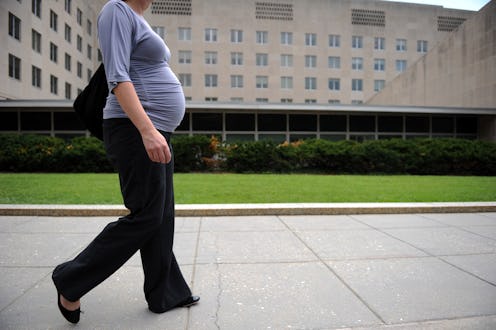News
Indiana Chips Away At Pregnant Women's Rights
In July 2013, Granger, Indiana resident Purvi Patel gave birth to a stillborn in her home bathroom after allegedly taking abortion-inducing drugs. Shocked and frightened, a bleeding Patel placed the stillborn infant in a dumpster before going to a local hospital for treatment. She was promptly arrested for "neglect of a dependent," then given the added charge of feticide. On Tuesday, a jury convicted Patel under Indiana's fetal harm law, a legal move that some say is not only contradictory, but threatens to undermine the rights of pregnant women in the Hoosier State.
According to the affidavit, 33-year-old Patel arrived at St. Joseph County Hospital with severe bleeding and in dire need of medical attention. After questioning from doctors, Patel — who told the jury she was traumatized from the birth — said she had a miscarriage and was only two months pregnant. Doctors later determined that Patel was further along, but prosecutors in court reportedly couldn't agree on the exact date of the pregnancy. Patel told the doctors at the hospital and testified in court that the baby was already dead once it was born, and she could not revive it.
By Patel's own account in court, she did not take any abortion-inducing drugs. However, the affidavit states she texted a friend saying she had purchased abortion pills online one month before, and intended to use them. Whether or not Patel attempted to self-abort with these miscarriage-causing drugs was disputed in court.
More than a year after her horrific ordeal, the jury found Patel guilty of both feticide — the killing of a fetus — and felony child neglect. Problem is, feticide only applies to an unborn fetus, and child neglect can only be applied when an infant was alive.
So, how can Patel be charged and convicted for both crimes? According to activists with the National Advocates for Pregnant Women and the Indiana Religious Coalition for Reproductive Justice, she can't be. Activists say the state is using Patel to set a dangerous precedent for pregnant women who find themselves in drastic situations, including being unable to afford or safely receive an abortion.
The National Advocates for Pregnant Women said in a statement sent to Bustle on Wednesday:
In this case, Indiana prosecutors equated neglect of a newborn with terminating a pregnancy and claimed the state has the right to lock up women suspected of attempting a self-abortion for as much as 70 years. This case and the verdict should send shockwaves through everyone who has an opinion about the right to choose abortion.
Indiana's fetal harm law is relatively new but not entirely untested. Prosecutors in the state have convicted just one other woman under the law, which forbids a person from "knowingly or intentionally" terminating a pregnancy "with an intention other than to produce a live birth or to remove a dead fetus." Abortion providers are excluded from penalties up to the 24th week of pregnancy, the accepted legal point of viability in Indiana. A conviction of feticide carries up to 20 years in prison, and there's no minimal sentence required.
Fetal harm laws are currently on the books in 38 states, but the implementation of the law is tricky — and in many cases, contradictory. The Indiana Religious Coalition for Reproductive Justice, which has been supporting Patel since her arrest, has stated that fetal harm laws were designed to protect pregnant women from third-party violence. But more and more, they're being used to punish pregnant women who have either attempted to terminate the pregnancy or endured a miscarriage.
This threat of imprisonment also fails to protect women like Patel who need medical attention following a self-attempted induced labor or abortion, or after a traumatizing miscarriage or stillbirth. "Medical and public health experts recognize that attaching the threat of criminal prosecution to an appeal for health care is dangerous and will push a woman into hiding," the Indiana Religious Coalition for Reproductive Choice said in a recent statement.
The law also fails to fully account for the reasons why a woman like Patel may wait so long to terminate a pregnancy and self-attempt an abortion. Patel testified in court that she was from a strict Hindu family, and had to hide her pregnancy from her family. Her father testified that he didn't believe in sex before marriage. The father of Patel's child was also a married man.
It's still unclear how the jury decided to convict Patel on both fetal harm and child neglect charges when doctors disputed whether or not the baby was alive at birth, and court documents made it clear that it was most likely a stillbirth. Reproductive health activists say Patel's case is an attempt to punish women for having abortions, even though many in the anti-abortion movement say they don't want to see women penalized. “Indiana prosecutors should not use the feticide law, intended to protect pregnant women, to put women who have abortions in jail," attorney Kathrine Jack, serving as counsel for NAPW and the Indiana Religious Coalition for Reproductive Justice, said in December.
The NAPW added in a statement on Wednesday that the organization will work to appeal the case because of the precedent it now sets for "harsh punishment of women who have abortions or experience pregnancy losses." Meanwhile, Patel will be sentenced in March, and is looking at up to 70 years in prison.
Images: Getty Images (2)
